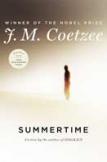Imaginary Friends
J. M. Coetzee has now published 20 books, among them several fictionalized autobiographies: Boyhood: Scenes from Provincial Life (1997), Youth (2002) and now this one, which covers the 1970s but is presented in our own year, following “John Coetzee’s” recent death, and told through the reminiscences of those who knew him back then. Boyhood deals, in third person, with Coetzee’s struggle in the 50s in Cape Town, South Africa, to gain some respect for his father while trying to recover from an overdependence on his mother. Youth moves into the 60s, and observes the same imagined character’s move to London and Berkshire, where he tries a desiccating job at a computer company while yearning for a literary life. There his ineptitude at poetry mirrors his nascent love life.
Coetzee published his first novel, Dusklands, in 1974, so we might expect that Summertime provides him an occasion to reveal the influences and processes that brought it about. Since this author’s forte is reticence, however, we are left to imagine how the ricocheting biographical details that occasionally shoot by the reader of Summertime might have resulted in the two violent and unrelated stories that make up the first novel: one a tale of the slow descent into insanity of an American agent of psychological warfare during the Vietnam War; the other the story of a Coetzee ancestor who was once nursed back to health by a Namaqua tribe in southern Africa, to whom he later returns and whom he slaughters. By analogy, the stories display the atavism at the heart of colonization and thereby announce the agenda for the rest of Coetzee’s work: typically, a relatively slight tale of a male protagonist uncomfortable with his body, his history, his ambitions and his coterie.
Surprisingly, and in a most roundabout way, one might conclude that Summertime’s meandering series of interviews with relatives and former lovers of “John Coetzee” (none of whom appears to mourn his passing) does reveal the perceptions faux intimates may have had of him during the 70s—at least in J. M. Coetzee’s imagination. The book provides a backhanded insight into what Coetzee imagines to have been the influences during his important creative decade, the one that set the stage for all the novels and essays that followed.
And what do the interviewed characters think of this future winner of the Nobel Prize for Literature and the Mann Booker Prize (twice, and a finalist again for Summertime)? The women wonder whether he might be homosexual—and if not that, then certainly not a very adroit or expressive lover (“neither rich nor handsome nor appealing....a narrow, myopic kind of cleverness...no sexual presence whatsoever”). Even now, decades after they had played a major role in his life, they are not very impressed with him. But since the author sees fit to include them in John Coetzee’s story, it would appear that he, on the other hand, was impressed with them—for good or ill.
Summertime compiles some snippets from 1972 to 1975 in a notebook the protagonist left behind, plus interviews undertaken by a Mr. Vincent as background for a proposed biography of the famous author. One might not be surprised that the inscrutable Coetzee would take the occasion of his autobiography to write, instead, the biography of others—his aged father, with whom he lives; one of his female cousins; the mother of a young Brazilian girl he tutored in English; a former married colleague at the university where he taught and with whom he had an affair. As an autobiography, this is a postmodern series of points of view—a kind of Afrikaner Rashomon—all truncated and filtered through an imaginary biographer. What is gained by this approach, among other things, is a suspension of suspicion on the part of readers who might otherwise look with a jaundiced eye on the autobiographer’s self-understanding. Since the contributors are unsparing in their bleak summaries of Coetzee’s limitations, readers are more likely to jump to the other side of the equation and mentally defend the famous man against these unfeeling or jealous individuals.
The first entry in the notebook asks the rhetorical question: “Where in the world can one hide where one will not feel soiled?” The answer for J. M. Coetzee would seem to be: between the lines—so see if you can find me. In fact, the central portion of this book, the interviews, might actually serve as a massive displacement of our attention, a plea not to focus on Coetzee but on the lives around him. Thus, while many of those interviewed argue that their lives must hold no particular interest except insofar as they had a relationship with the famous man, J. M. Coetzee seems to feel differently, surrendering the bulk of the book to them and to an account of their lives. But since the bulk of the book is surrendered to them, and since they are J. M. Coetzee’s imaginary playthings, the author seems to feel differently.
The other bookend, though, is a number of undated notebook fragments, and these obsess over John Coetzee’s relationship with his father. Near the novel’s end he pleads for forgiveness...
for countless acts of meanness. For the meanness of heart in which those acts originated. In sum, for all I have done since the day I was born, and with such success, to make your life a misery.
The “agenbite of inwit” (prick of conscience) to which he refers in an early notebook entry haunts this novel, as it seems to haunt the body of Coetzee’s writing.
The story is not over. There are several decades left for this fascinating chameleon to recreate, but for all his particularity he manages to sound very much like Everyman.
This article also appeared in print, under the headline “Imaginary Friends,” in the March 1, 2010, issue.








